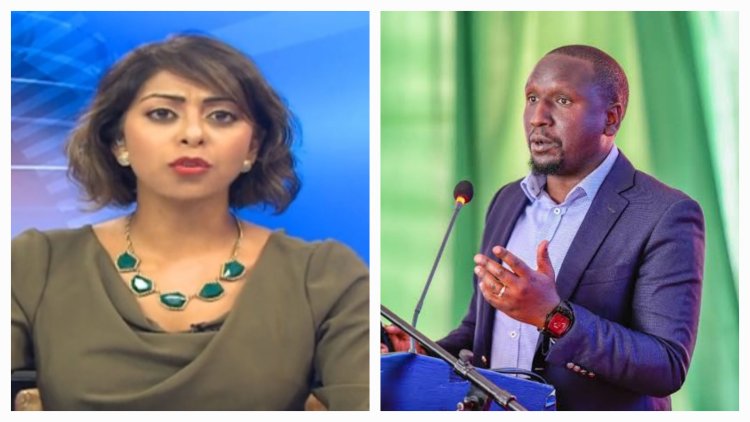John Allan Namu: How 2022 Elections Exposed Problems In Kenyan Media
The former KTN investigative journalist singled out the 2022 general elections which offered Kenyan media a chance to...

Award-winning veteran investigative journalist John Allan Namu, the Chief Executive Officer (CEO) of Africa Uncensored, uncovered the shortfalls endangering the credibility of Kenyan media houses amidst incessant calls for a crackdown that have generated uproar.
In a detailed Twitter thread on Thursday, March 9, Namu narrated how a wholesale attack on the media fraternity that used to trigger outrage has slowly become acceptable to members of the public.
The former KTN investigative journalist singled out the 2022 general elections which offered Kenyan media a chance to team up and provide Kenyans with one channel where they could broadcast results live, as they streamed in through the Independent Electoral and Boundaries Commission (IEBC).
"The 2022 election was an opportunity for the news media to band together and provide the public with credible tallies and reporting of the election results. As many have explained, for numerous reasons, this didn't happen. But then something far scarier took place.

"Decisions were made at very senior levels of some media houses to pick sides. It would have been badly received if they had been open about it but at least the public would have known and adjusted their lenses appropriately. Instead, they went with the veneer of objectivity," he wrote in part.
To prove this, Allan Namu approached a few journalists drawn from various media houses who witnessed it unfold first-hand, as pressure began being applied on senior journalists to skew their own tally, deep into the tallying process.
"Were it not for the absolute courage of a few editors who refused to go through with this plan, then a deliberately misleading piece of fake news would have been published and further dented an already flawed process. It was not for a lack of pressure
"Some editorial staff had to hide in a make-up room to avoid being forced to read the statement that their boss wanted made," he went on.
He took the time to commend the courageous acts which consigned a press statement issued by some to fake news whereas it actually was authored, with ex-co officials from other media houses refusing to sign on.
He reminded his followers against demeaning the drive of many journalists in the profession to their full potential even though the media on many occasions has been subject to criticism by Kenyans, some of whom follow media houses religiously.
"The point here is even when we tar the media with a single brush, we should be careful not to undermine the dedication of many in the profession to greater ideals. Granted, there were missed opportunities and many mistakes, but there still exists integrity within these same institutions that sadly is lacking in the political realm that judges the media today," he continued.
Namu then revealed that the problems of news media credibility stretched beyond one election as 2022 became a flashpoint that exposed several issues; news media revenues being under pressure for the better part of the past decade and a failure to recognise the coming changes contributed by better internet access.
During his career, he recalled witnessing some make poor investments, others stay complacent and all of the media miss the boat, noting that training for the current generation in journalism should have commenced at that time.
"I often remember when Larry Madowo opened KTN's first Twitter/Facebook accounts. I remember how colleagues and some of our bosses sniggered at this 'childish' venture, not seeing the opportunity and the threat that not taking these platforms seriously posed.
"A few years later, Jubilee one's term began. The GAA (Government Advertising Agency) was formed and soon, over a billion shillings in revenue was withheld from all mainstream media houses. Soon, profit warnings began being issued (the earliest was 2015/16 by Standard Group I believe, but I may be wrong), but most dug their heels in, defending our models and choosing to think that GoK was the real source of their problems," he recounted.
He noted that the scene changed when consumers loyal to media houses began to access better content from around the globe and were influenced by their economic status to cast their votes.
In addition, younger news organisations such as Viral Tea and others that started in the previous decade began building models in preparation for the digital era, which has since seen viral news replacing breaking news alerts that were issued in Short Message Service (SMS) format.
"Then digital advertising became more precise, and the age of the influencer was upon us. Another blow. What started at the margins of the mainstream with make-up tutorials became mainstream
"Money making, but not quite enough to supplant long-term investments that the media had made. But the stars were aligning. In all this, our talent pool became more and more sparse, for various reasons," he continued.
He further lamented that Kenyan journalism has been turned to flagging instead of flourishing with the implementation of fact-checking and data as basics as well as a skills gap that needs to be bridged, on top of a male-dominated leadership which is also ageing and top-heavy.
With the public demanding the media to be better than it is, Namu recommended that media houses collaborate more, putting more value on a good story rather than a media house with a good story.
"While we are in competition, there are far more areas for collaborative work than there are points of divergence. Speaking with one voice to defend press freedom is one place but that's never been a problem. Finding a solution for staffing and new work arrangements is much harder
"But will have a far greater impact if done for the greater good. Negotiating together with GOK on data law and policies towards more open governance, and with big platforms on opaque algorithms is another potential area. Devoting more time to training and mentorship," he added.
Majority Leader in the Senate, Aaron Cheruiyot triggered an uproar on Monday, March 6 across the media fraternity, some members of the public and the opposition as well as within the government when he called upon President William Ruto to censure the country's media.
“If crushing things is a government policy, then there is surely no shortage of things to crush like the high cost of living, high fuel prices, the price of unga, the free fall of the shilling. That would be a good place to start.
“As a lawmaker, Cheruiyot ought to know that the media is not just a business. It is directly linked to the canal of a democratic society in its plurality and totality," stated NTV news anchor Smriti Vidyarthi during the 9 pm prime time news bulletin later that day.


 admin
admin 




